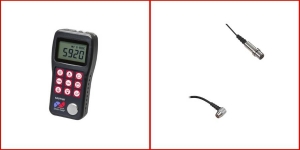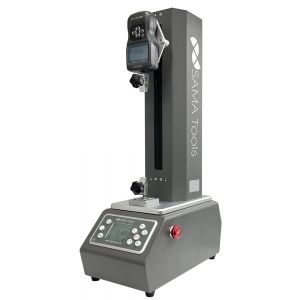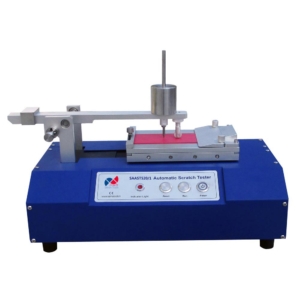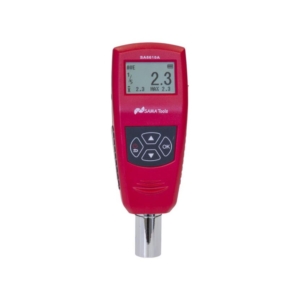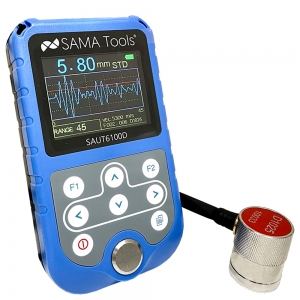The Oil & Gas sector requires technologically advanced products, capable of operating in difficult environmental and climatic conditions. At the same time, when storing hazardous substances, preventive actions must be taken to reduce the risk of leaks. This certainly includes quality control procedures for Oil & Gas.
For example, tank corrosion can cause environmental contamination due to leaks. Based on this premise, each manufacturer must take care to inspect, service and calibrate their quality control equipment.
We are proud to be able to talk about one of our customers, who is a leading producer of welded pipes in the Oil & Gas market.
Quality control of welded tubes: Inox Tech Spa
Inox Tech S.p.A produces welded pipes (SAWL) in corrosion-resistant metal alloys (CRA). This Italian company, based in Lendinara was founded in 1989 and has evolved and specialized as a manufacturer and focuses on LNG, refineries and submarine applications with the highest quality standards, guaranteeing flexibility, reliability and effectiveness to all it’s customers.
Their main production line consists of thick welded tubes, with external diameters that can reach up to 110”, and with wall thicknesses of up to 70 mm. In addition to this particular line, they create solutions of smaller dimensions and thinner thicknesses, starting from an external diameter of 6”and wall thickness of 4 mm.
These pipes are mass-produced thanks to their recently renovated factory and first-rate technologies, which allows Inox Tech to reach a production capacity of 30,000 tons a year. The products obtained are only of the highest level, thanks to their API certification with the 3 monograms (API 5L, 5LC and 5LD), an ISO 9001 certified quality system, and various awards received from the most important companies in Oil & Gas such as: ExxonMobil, Shell, Total, and Saudi Aramco.

Copyright © Inox Tech SPA
The internal laboratory guarantees high quality standards
In addition to the certifications mentioned above, the Inox Tech plant is equipped with a quality system and related equipment that allows them to check the characteristics of the materials, the quality of the welds, to ensure compliance with the regulations and above all, to guarantee the highest quality products.
It also collaborates with an independant accredited laboratory, which is located inside its own factory. This allows them to perform the destructive tests on the materials required “in house” to verify the chemical and mechanical properties.
Destructive Control
The destructive tests that are usually required for their products include:
- Product / Chemical analysis
- Pull tests at hot and room temperature
- Crease tests
- Impact tests to -196 ° C
- Hardness tests
- Standard corrosion tests (G48, G28, etc.)
- Drop Weight Tear tests (DWTT)
- Hydrogen Induced Cracking tests (HIC)
- Sulphide Stress Cracking tests (SSC)
Non-destructive Control NDT
While the non-destructive tests carried out entirely by their internal personnel include:
- Penetrating liquids
- Manual ultrasound tests
- Radiography (traditional and digital X-rays)
- Magnetic detectors
- Positive Material Identification tests (PMI)

Copyright © Inox Tech SPA
The stages of quality control at Inox Tech
We have already mentioned that Inox Tech is equipped with a certified quality system for all equipment and tools which therefore allows all quality control tests to be carried out internally.
Based on the test performed and what needs to be determined, quality control can be performed at every stage of the manufacturing process.
For example, if the goal is to determine the quality of raw materials, the test can be performed upon receiving the goods from suppliers. The welds can be verified as soon as they are completed, while the quality of the tube can be tested, as soon as it leaves the production line.
Having your own equipment and tools is a significant advantage, as it makes the company’s quality control system very efficient. Inox Tech also needs high-level quality control tools to make sure that all controls and inspections are accurate and reliable.

Copyright © Inox Tech SPA
5 measuring and control instruments for the Oil & Gas sector
Inox Tech relies on SAMA Tools as a trusted partner and supplier of quality control tools to guarantee highly accurate and reliable results.
We offer them and all our customers, high quality control and measurement instruments, such as:
1. High quality carbon fiber digital caliper – SAM039
A great measuring tool to check geometric dimensions. The fact that it is made of carbon fiber makes it very light and comfortable for the operator, while still being considerably sturdy.
2. Portable surface roughness tester – SA6220
Surface roughness is essential to check the quality of the pipes. Portable roughness meters allow you to do this both on the production line and in the laboratory.
3. Precision ultrasonic thickness gauge – SAUT160
A professional tool to determine the wall thickness of pipes made by Inox Tech. The materials in question are Stainless Steel, Duplex, Super Duplex, Nickel Alloys, SS 6Mo, Carbon Steel and Low Alloy Steel.
4. Through coating ultrasonic thickness gauge with software included – SAUT310D-SW
Because they are exposed to highly abrasive and corrosive environments, oil and gas pipes are generally protected by coatings and paints. This ultrasonic thickness gauge is able to work in “through paints” mode to detect the thickness of the underlying material.
5. LED industrial viewer – SANEG-300/16
The industrial LED X-ray film viewer is essential for radiographic analysis, as it provides a reduction in energy in the form of heat, uniform light and superior durability while minimizing maintenance costs.
Why choose SAMA Tools for your quality control?
Thanks to the ISO-9001 certified quality system, all SAMA Tools instruments are rigorously checked and inspected from the initial phases up to when it’s shipped to the customer. Furthermore, upon request, the instruments can be accompanied with a calibration report with reference to primary samples or by an ACCREDIA certificate.
In addition to the constant work of checking and inspecting our equipment, we are keen to assist our customers with the installation and during the first measurements, to accompany them throughout the most delicate phases of their tests. All-round technical assistance is our mission. This way, Inox Tech and all our customers, can learn concepts that go far beyond the simple reading of a manual.
The win-win strategy
A more personal collaboration, guided by mutual trust, makes work more enjoyable and helps to build a win-win relationship.
The strategy of winning together is a way of thinking and acting that leads us and our customers to build a sincere bond.
This is exactly what happened with Inox Tech. Thanks to the kindness of their staff, we consider them as our special clients. Even though the ultimate commercial goal of any company continues to be the sale, this cannot be seen as a mere exchange of money.
The approach of S.A.M.A. Italia to the client is consultative. Therefore, we want to convey the value of the solutions we offer. We do this by placing the customer at the center of every conversation.
Closing thoughts
As you may have understood, our mission is to make customers reach high quality standards and we are really proud of our collaborative relationship that we’ve created over the years together with Inox Tech S.p.A.
Here you can find feedback from the many customers who have chosen us and we hope that you can soon become one of them, too.
Therefore, if you need help in choosing the best measuring instruments for your specific needs, and / or you need calibration reports (even on instruments of other brands), do not hesitate to contact our technical department.
You can call us at +39 0584/392342 – 0584/392453 or if you prefer, you can contact us in writing at sales@samatools.it.



